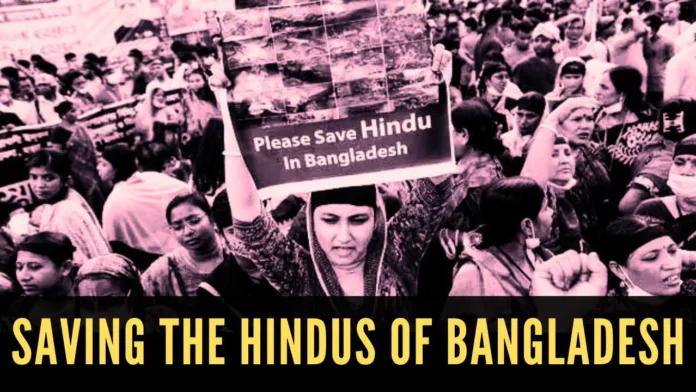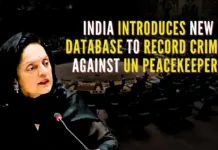
Support for Hindus of Bangladesh
The territories that now constitute Bangladesh were once part of ancient kingdoms of Bharat, like Anga, Vanga, and Poundraka. There has been a rich unbroken history of more than 5000 years of the region along with the rest of Bharat. Matrimonial relationships between royalties of this region, with the families of royalties as far away as Gujarat and Rajasthan, and much beyond, are well documented. Their traditions, customs, and language all had connections and a continuum with the rest of Bharat.
Historical connection as part of Bharat
The Shakti Sampradayas of Bengal very much exist in today’s Bangladesh as well. In spite of barbaric destructions unleashed by Pakistan before partition, after partition, and in the early 1970s, there are scores of Shakti mandirs that exist even to this day. Most of them are Kali Matha mandirs with different aspects of Maa Kali. Anandamayi Kali Mandir, Brahmanabarya; Sugandha Shaktipeeth, Barisal; Bhabanipur Shaktipeeth; Bogra Chatteshwari Mandir, Chittagong District; Lalmayi Chandi temple, Komilla district; Dhakeshwari National Temple, Dhaka; Joy Kali and Ramana Kali Mandirs of Dhaka; Kalibari Mandir, Khulna; Pangeshwari Mandir, Rajarhat; Sindhurmati Dighi, Rajarhat; Kalyandi Durga Mandir, Noakhali; Chandipur Kali Mandir, Rajshahi; Jeshoreshwari Kali Mandir, Satkhira District; Mahalakshmi Bhairab Mahapeeth, Sylhet – just to name a few. While some of them are completely reconstructed like the Ramana Kali Mandir of Dhaka, most of these mandirs have rich legacies going back to hundreds of years.
While the rulers of these territories changed – from Hindu Kings to Muslim Sultans to the zamindars and the British, culturally, and spiritually, these places were always connected with the rest of Bharat. Many Sadhus, Nagas, and Aghoris used to visit these Shaktipeeths before the partition. The Vamachara Puja Paddhathis as can be seen in West Bengal and Assam, are also followed in Bangladesh. The locals believe that several parts of Sathi Matha fell in several parts of what is Bangladesh today. There are numerous Ashrams that exist even today like Panchanan Dham Ashram, Nigamananda Paramahamsa Ashram, Taracharan Sadhu Ashram of Chittagong District, Loknath Baba Ashrams across Bangladesh, Ramakrishna Mutts, and several others. ISKCON is active and has several temples across the country.
Post-colonial saga
While the situation of Bangladeshi Hindus is not as hopeless as that of their counterparts in Pakistan, it is still precarious and doesn’t look positive for them. From about 28% in 1941 to about 13.5% after they broke away from Pakistan in the early 1970s, to 7.5% in 2022, the percentage of the Hindu population has been declining rapidly. Though some of the non-Muslim tribals are not shown as Hindus, yet the overall demographics of Hindus don’t look encouraging.
Massive waves of migrations during the partition period and in 1971 could be some of the causes for this rapid decline; the decline post-1971 also has religious aspects to it. While there are several instances of conversions, and constant attacks on Hindu temples, Hindu festivals, and Hindu settlements, the biggest threat Hindus have been facing is Land Jihad. Several Muslims are using the religious card to usurp lands and properties of Hindus; not just the temple lands, even several temples have been occupied by local Muslims. Repeated attacks on Hindu festivals are used as a tool to terrorize them into submission. The sad and ugly Love Jihad also is being used frequently with many young Hindu girls being kidnapped or trapped into conversion and marriage into Muslim families, both for capturing the Hindu wombs as well as their lands and properties. The administration, judiciary, and political establishment are all guilty of denying justice and dignity to Hindus, in some measure or other.
The challenges that the Hindus of Bangladesh face include a lack of political voice, lack of international support for their plight, indifference of Bharat, coupled with poor education standards and lack of multilingual skills, just to name a few. While the Awami League of Sheikh Hasina is better than the fanatic BNP’s Begum Khaleda Zia (the main opposition party), there are limits even for Sheikh Hasina to support the Hindus without antagonizing the majority of Muslims in the country. While the international community talks eloquently about the plight of Uyghurs in Xinjiang and Buddhists in Tibet, there are not even aware, let alone raise a finger in support of Bangladeshi Hindus. Bharat’s govt by construction and policy doesn’t interfere in matters that happen beyond its borders. The bureaucracy and administration of Bharat don’t act and behave like a civilization. The love for the Bengali language, which was the root cause of Bangladesh breaking away from Pakistan, is also a hurdle especially for the Hindus of Bangladesh, to connect beyond their borders. Their inability to speak Hindi or even English severely restricts their ability to travel beyond West Bengal in Bharat, or to any other country abroad.
Road ahead
While the Hindus of Bangladesh are doing their best to survive and pass on their heritage to the next generation, they could do well by taking a few more measures like actively joining the administration, judiciary, and army. They have to significantly increase group activities, especially religious activities, to showcase the strength and unity of the community. The concept of Ayudha Puja or the worship of weapons is ingrained in Shakti Upasana, it is customary for Hindus to worship weapons during the Dusshera period. Even Bharat’s Prime Minister Narendra Modi was seen worshipping weapons on Vijayadashami. Bangladeshi Hindus would do well for themselves if they restart this Parampara again, by teaching the younger generation the use of weapons as a part of ritualistic symbolism. This would enable them to be trained to at least defend themselves when riots break out against them. While no one wishes violence, one should be prepared for any unfortunate eventuality.
The role of Govt of Bharat in protecting the Hindus of Bangladesh is very significant and crucial. They should first accept the problem and make it a part of their obligation to protect the Bangladeshi Hindus. The Govt of Bharat should behave like Govt of Bharat, a civilizational nation. Once the Govt of Bharat accepts its obligations, it would actively use the `carrots and stick policy’ to make the Bangladeshi establishment behave properly with the Hindus of Bangladesh. The Govt of Bharat should allocate specific budgets every year for the restoration, upkeep, and maintenance of ancient temples and monuments in Bangladesh. The Govt of Bharat should prevail upon the Govt of Bangladesh to allow easy access to Sadhus, Nagas, and Aghoris of Bharat to easily and frequently visit the holy places of Bangladesh. While the Govt of Bharat is liberal in issuing medical visas, as Govt of Bharat it should introduce a special visa category called Yatra – Visas to the Hindus of Bangladesh with multiple entry options of at least ten years validity. Such a visa would allow the Hindus of Bangladesh to freely and frequently visit Hindu Kshetras of Bharat. In times of sectarian violence and tensions, these yatra visas would also help the Hindus of Bangladesh to temporarily come to Bharat and save themselves from being physically annihilated. The Bharateeya leadership has to make it a point to frequently visit Bangladesh and during every such visit, they should also visit the holy places so as to give a message of support to the Hindus of Bangladesh, as well as a message to the Govt of Bangladesh to protect the same.
It is the duty of every Sanatani of Bharat to also stand up for the Hindus of Bangladesh in all and every possible way. From visiting Bangladesh in large numbers as Yatris, to petitioning the Govts of Bharat and Bangladesh for better access and facilities, as well as in support of the Hindus of Bangladesh, they have a very big role to play. Those that cannot travel to Bangladesh, could lend their support through social media or other means, or donate to organizations that are working to help the Hindus of Bangladesh. The Govts of Bharat and Bangladesh, the Hindus of both nations, and the larger Sadhu Samaj should all come together to protect the Divya-Kshetras and the remaining Hindu population of Bangladesh, failing which it would turn into another Pakistan or Afghanistan.
Note:
1. Text in Blue points to additional data on the topic.
2. The views expressed here are those of the author and do not necessarily represent or reflect the views of PGurus.
PGurus is now on Telegram. Click here to join our channel and stay updated with all the latest news and views
For all the latest updates, download PGurus App.
- Crumbling throne of the Dragon - November 4, 2023
- Saving the Hindus of Bangladesh - August 14, 2023
- Time for Bharat to take over from India - May 24, 2022










